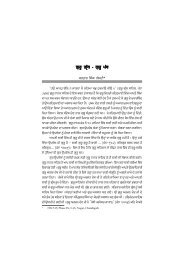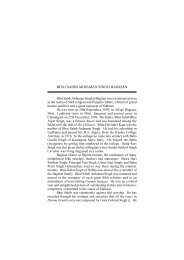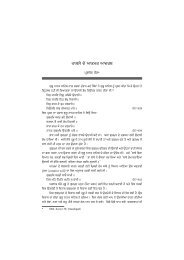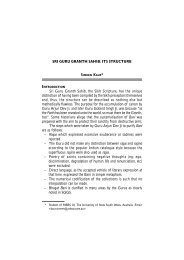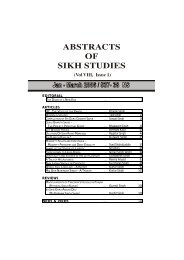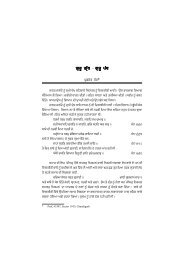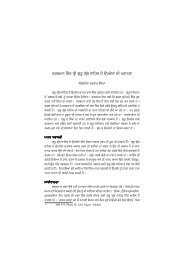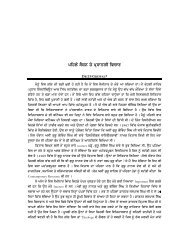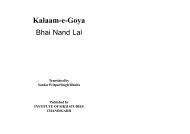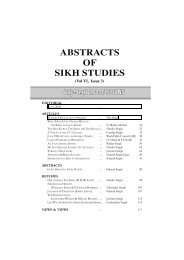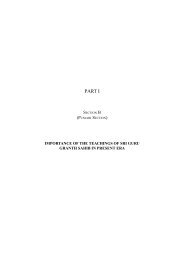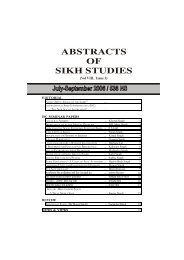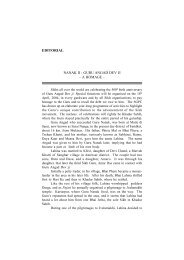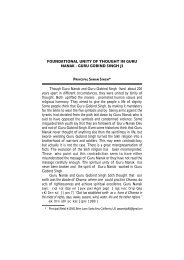editorial articles reviews news & views - Institute of Sikh Studies
editorial articles reviews news & views - Institute of Sikh Studies
editorial articles reviews news & views - Institute of Sikh Studies
You also want an ePaper? Increase the reach of your titles
YUMPU automatically turns print PDFs into web optimized ePapers that Google loves.
MCLEOD & FENECH AS SCHOLARS ON SIKHISM AND MARTYRDOM<br />
77<br />
concept <strong>of</strong> martyrdom or not Since mutual contradictions form part<br />
<strong>of</strong> McLeodian style and the brief given by him, neither McLeod nor<br />
his yuppy is bothered about that, so long he gets his degree and is<br />
established as a McLeodian scholar.<br />
This raises another concomitant, important, question as to why<br />
do the universities like that <strong>of</strong> Toronto give doctorate on such stupid<br />
works which have neither head nor tail to stand upon Why should<br />
the universities like that <strong>of</strong> Toronto pawn themselves to scholars like<br />
Hew McLeod, specially when “Canada talks <strong>of</strong> multi-culturalism”<br />
Another question that comes up is whether the University <strong>of</strong> Toronto<br />
is a captive organization, or does it have a poor standard like some <strong>of</strong><br />
the universities in India. Someone shall have to address himself to<br />
these questions. I shall have to come to some <strong>of</strong> them later.<br />
Coming back to Fenech’s first chapter. In the second paragraph,<br />
Fenech garbles the basic facts <strong>of</strong> <strong>Sikh</strong> history and attributes victory <strong>of</strong><br />
Panth “to Ranjit Singh’s capture <strong>of</strong> Lahore in 1799", bypassing the<br />
<strong>Sikh</strong>’s capture <strong>of</strong> Lahore in 1765, striking their coins, and establishing<br />
their rule over Punjab under the <strong>Sikh</strong> Misls. This indicates that Fenech’s<br />
understanding <strong>of</strong> <strong>Sikh</strong> history is partial, flawed and imperfect.<br />
Thereafter, Fenech struggles to discuss why the <strong>Sikh</strong>s used the<br />
Arabic word Shahadat (martyrdom) or Shahid (martyr). He concedes<br />
that such a term does not exist in Hindu lexicon. He brings in the<br />
Hindu concept <strong>of</strong> animal sacrifice which is miles away from the Arabic<br />
concept <strong>of</strong> Shahadat, or rather has no relevance at all. He maliciously<br />
fights shy <strong>of</strong> accepting G S Talib’s centention that <strong>Sikh</strong>ism’s adopting<br />
the term Shahid was with a view “to chalkout a line <strong>of</strong> orientation for<br />
itself away from Brahminical orthodoxy and other religious side as<br />
rooted in Hinduism”, and “to buttress non-Hindu identity”. That<br />
strikes at the roots <strong>of</strong> his guide McLeod’s basic precepts and the brief<br />
given to him to prove Guru Nanak only within the Hindu framework.<br />
Fenech, therefore, has nothing but to fall for Harjot Oberoi’s contention<br />
that all aspects <strong>of</strong> pre-colonial <strong>Sikh</strong> thinking was rooted in “Indic<br />
cultural thinking,” to exclude the impact <strong>of</strong> Islam on the current Indian<br />
thinking. But Fenech continues to be confused, not knowing whether<br />
to term the <strong>Sikh</strong>s, he is dealing with, as martyrs or otherwise. Though



